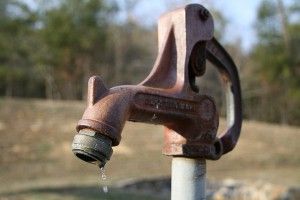As CA conserves, Feinstein renews relief push
With the latest numbers showing a drop in California water consumption, attention has turned to a new drought relief bill introduced by Golden State U.S. Sens. Dianne Feinstein and Barbara Boxer.
 The figures eclipsed earlier embarrassments faced by water districts where consumption actually spiked, sometimes for unknown reasons. “California’s urban water districts cut consumption by 27.3% in June,” the Wall Street Journal observed, “exceeding a tough new state mandate to reduce their combined use by 25% amid a prolonged drought. The savings compared with the same month in 2013 came despite June being the hottest month on record in the Golden State, officials from the State Water Resources Control Board reported Thursday.”
The figures eclipsed earlier embarrassments faced by water districts where consumption actually spiked, sometimes for unknown reasons. “California’s urban water districts cut consumption by 27.3% in June,” the Wall Street Journal observed, “exceeding a tough new state mandate to reduce their combined use by 25% amid a prolonged drought. The savings compared with the same month in 2013 came despite June being the hottest month on record in the Golden State, officials from the State Water Resources Control Board reported Thursday.”
Partisan jockeying
In a statement, Feinstein tried to tempter expectations behind her renewed push for relief. Some analysts expect Republican opposition over its high cost and environmental protections. “I’ve introduced a lot of bills over the years, and this one may be the most difficult, and a warming climate will only make things worse,” she said. “I’m hopeful the bill we’re introducing today will serve as a template for the kinds of short-term and long-term solutions California needs to address this devastating drought.”
But some Democrats have become concerned that Feinstein’s effort cedes excessive ground on environmental regulations, hewing too closely to previous relief plans that wound up losing Boxer’s support. Feinstein had determined that the drought crisis was severe enough to justify negotiating with House Republicans — a maneuver that undermined her support within her own party, causing her to abandon the push.
This time around, revealing Boxer’s support for the rejiggered bill “surprised some stakeholders who saw the negotiations fall apart late last year over proposed changes to endangered species protections,” according to E&E Daily. Although Boxer said she was “pleased to be sponsoring” Feinstein’s new bill “because of the enormity of this crisis,” other Democrats, such as Rep. Jerry McNerney, D-Calif., warned they were “very concerned about some provisions included in the bill that are similar to the House Republican water legislation” that drove Boxer away to begin with.
A long road
That legislation was H.R. 2898, introduced by Rep. David Valadao, R-Calif. As the Sacramento Bee recounted, the bill would have supplied farmers south of the Delta with more water and sped up the federal approvals process, where stringent environmental rules can sometimes grind water and infrastructure plans to a virtual halt. Hurried along late last year during the lame-duck session of Congress, it sailed through the House with staunch Republican support, but provoked president Obama to threaten a veto, and drew strong criticism from California’s delegation of Democrats in both houses of Congress.
Feinstein herself finally caved. “There are several other provisions that would waive environmental protections that need to be changed before I could support them,” she explained, according to the Bee. “I have said all along that I will not support a bill that would waive these protections, and that remains true today.”
Now, her aim has been to replace “some provisions disliked by environmental groups” with “some of their priorities, such as a greater focus on recycling,” according to the Associated Press. “Feinstein said the shift changes the emphasis of the bill from a short-term effort to a long-term one. She said her bill would cost an estimated $1.3 billion over 10 years.”
But even assuming Feinstein could placate environmentalists and other Democrats, she recognized that the bill’s fate could well hinge on a single Republican colleague. In the machinations of Senate lawmaking, Feinstein’s objective has been to package her bill inside of planned legislation to be introduced by Sen. Lisa Murkowski, R-Alaska, chairwoman of the Energy and Natural Resources Committee. “That Murkowski bill is likely to serve as a vehicle for several state-specific drought relief measures, as well as overarching federal policy changes,” E&E Daily confirmed.
Related Articles
Pulling Back CalPERS' Ethics Curtain
JAN. 7, 2010 By WAYNE LUSVARDI The Securities and Exchange Commission has exposed the self-righteous CalPERS, the California Public Employees
CA schools pass weakened assessments
Californians troubled by the public school drive toward statewide standardized testing now face a reformed — but weaker — system of assessment.
Lockyer: RDAs Entering Into Bad Deals
FEB. 14, 2011 By KATY GRIMES Immediately following Gov. Jerry Brown’s budget proposal in January, the Legislative Analyst’s Office published



